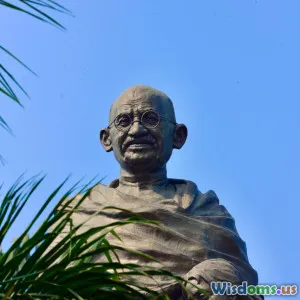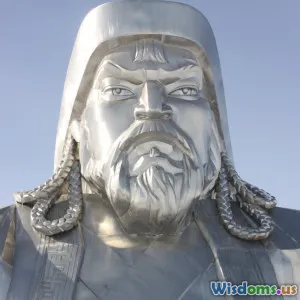
Inspiring Legacies of Historical Figures
7 min read Explore the enduring legacies of historical figures who shaped our world with courage, vision, and humanity. (0 Reviews)
Inspiring Legacies of Historical Figures
History is a vast tapestry woven with the threads of extraordinary individuals who shaped the course of human civilization. These figures—leaders, thinkers, revolutionaries, and visionaries—have left legacies that resonate far beyond their own eras. Their lives inspire us to overcome adversity, foster innovation, and pursue justice. This article explores the enduring legacies of select historical figures, illustrating how their principles and actions continue to influence the modern world.
The Power of Vision: Leonardo da Vinci’s Boundless Curiosity
Leonardo da Vinci is often described as the renaissance man par excellence. Born in 1452, his insatiable curiosity and interdisciplinary genius propelled him to excel in art, engineering, anatomy, and more.
His visionary notebooks reveal concepts centuries ahead of their time—flying machines, advanced weaponry, and anatomy diagrams so precise that they remain highly regarded today. Beyond his technical genius, Leonardo’s legacy teaches us about the power of creativity and continuous learning.
As he wrote, “Learning never exhausts the mind.” This emphasizes that intellectual curiosity is a lifelong pursuit, inspiring innovators across generations.
Courage and Justice: The Legacy of Harriet Tubman
Harriet Tubman (c.1822–1913) is remembered as a courageous conductor on the Underground Railroad. Born into slavery, Tubman escaped and then risked her life repeatedly to lead others to freedom. Her tenacity wasn’t limited to abolition; during the Civil War, she served as a spy and nurse and advocated for women’s suffrage afterwards.
Tubman’s legacy lies in her profound commitment to freedom and human dignity. Economist and historian Thomas Sowell wrote, “Her courage highlights how one person’s action can ripple through society, changing the fabric of justice.”
Her life reminds us that resilience, combined with a moral compass, can enact profound social change.
Innovation and Leadership: Nikola Tesla’s Impact on Modern Technology
Nikola Tesla (1856–1943) embodies the archetype of the brilliant inventor whose legacy powered the 20th century and beyond. Tesla’s work on alternating current (AC) electricity revolutionized how power could be generated and distributed sustainably and efficiently.
Despite dying in relative obscurity and financial hardship, Tesla’s intellectual contributions underpin modern electric grids, wireless technology, and even ideas foundational to smartphones.
His story also serves as a cautionary tale about the challenges inventors face within commercial environments. Tesla once said, “The present is theirs; the future, for which I really worked, is mine.”
This statement symbolizes the delayed but enduring impact of true innovation.
Peace and Reconciliation: Nelson Mandela’s Example
Nelson Mandela’s legacy is a beacon for peace and reconciliation worldwide. Imprisoned for 27 years for resisting apartheid in South Africa, he emerged ready to lead a divided nation towards democracy and equality.
Mandela’s dedication to forgiveness rather than vengeance was instrumental in preventing civil war and building a multiracial democracy. His commitment to human rights earned him the Nobel Peace Prize in 1993.
Mandela once said, “I am fundamentally an optimist. Whether that comes from nature or nurture, I cannot say. Part of being optimistic is keeping one’s head pointed toward the sun, one’s feet moving forward.”
His legacy teaches that reconciliation and optimism can repair even the deepest societal wounds.
Scientific Advancement and Humanitarianism: Marie Curie’s Dual Legacy
Marie Curie, the first woman to win a Nobel Prize and the only person awarded in two scientific fields (Physics and Chemistry), exemplified pioneering spirit and service.
Her groundbreaking research on radioactivity not only advanced physics and chemistry but laid the groundwork for medical treatments like cancer radiotherapy.
During World War I, Curie drove mobile radiography units to assist battlefield surgeons, blending scientific advancement with humanitarian aid.
Her legacy is twofold: relentless pursuit of knowledge and dedication to improving human lives.
Conclusion: Learning from Historical Legacies to Inspire Today
The stories of da Vinci, Tubman, Tesla, Mandela, and Curie emphasize diverse paths to creating enduring legacies—through curiosity, courage, innovation, reconciliation, and humanitarianism. Each figure faced unique challenges, yet their collective story is one of transformative impact born from unwavering principles.
In today’s complex and fast-changing world, these legacies remain instructive. They challenge us to:
- Embrace multidisciplinary learning and creative problem-solving.
- Stand courageously for justice and equality.
- Value innovation for societal good beyond personal gain.
- Prioritize peace and healing in fractured societies.
- Combine expertise with empathy to improve lives.
By reflecting on their examples, we can find purpose and motivation to contribute meaningfully in our own ways—building legacies that resonate well beyond our lifetimes.
References
- Isaacson, Walter. Leonardo da Vinci. Simon & Schuster, 2017.
- Larson, Kate Clifford. Bound for the Promised Land: Harriet Tubman, Portrait of an American Hero. Ballantine Books, 2004.
- Chen, Jingye. Nikola Tesla: Physics and Patents. University Press, 2015.
- Sampson, Anthony. Mandela: The Authorised Biography. HarperCollins, 1999.
- Quinn, Susan. Marie Curie: A Life. Da Capo Press, 1995.
Each of these figures demonstrates that history’s greatest legacies come from embodying the enduring values of knowledge, courage, innovation, peace, and humanitarianism.
Rate the Post
User Reviews
Popular Posts




















